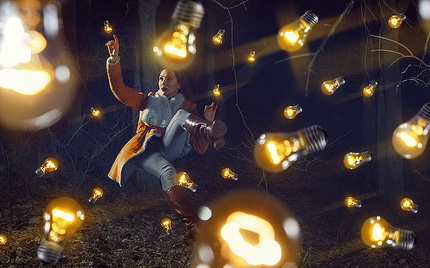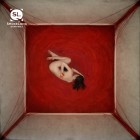We noticed the coins first. The night before, a Tuesday, we drifted off to sleep in the ordinary world, and sometime in the night, the earth loosened its hold on us. We woke to floating disks of copper and nickel above the nightstand where we’d emptied our pockets, yesterday’s change suspended in the air like a model solar system.
We saw our children walking on air, their feet skimming empty space inches above the floor. When we stepped out of bed, we felt it, how our heels didn’t quite sink into the carpet. No more footprints. In the bathroom mirror, we saw our hair lifting away from our faces, fanned out and wild, a cartoon portrait of shock.
We found new ways to hold things down. The supermarkets quickly ran out of double-sided tape and strips of Velcro, useful for sticking bottles and canisters to the kitchen counter, for keeping knick-knacks in place on the mantle, lamps grounded to end tables. We fit our shelves with doors to hold the books in place and carry twine to secure anything in danger of floating away. No one wears skirts anymore. We’ve tried to adjust.
Eating is still difficult: our mashed potatoes hover above the table like clouds; our drinks won’t stay in the glass. We add more butter to the potato recipe, trying to weigh them down, and lap the water from the air like children chasing snowflakes with their tongues.
There is no precipitation in a world of diminished gravity, and we miss the rain. The clouds release their water and raindrops gather and circle high above the ground. We look up during a rainstorm as if looking at the sky from the bottom of a lake, the sun blurry behind a sheet of water far above our heads. Without rainfall, the grass turns brown, and so we mow the lawns one last time. The clippings rise into the air around us, fistfuls of confetti that will never fall.
Each morning when we open our closets, the sleeves of our shirts are raised in the air, reaching for something we can’t see. Sometimes, we walk into the hall and are startled by a scarf that got loose, a silk ghost in midair slipping silently through the house.
So many things are loud in this world. Aspirin rattles in its plastic bottle, silverware clatters in closed kitchen drawers. Dolls knock against the lid of a toy box. Everything we’ve tried to contain is breaking free. Even the moon has retreated a little further into the background of the sky.
When it gets too loud, we walk to the beach, where the oceans have stilled and our ears fill with the quiet of a shore that has no waves. We cover our faces with sunglasses and scarves to keep the loose grains of sand out of our eyes.
Some of us dream of the day the earth will remember itself and restore gravity. We live in fear of everything we have forgotten to tie down; we imagine a chef’s knife sliding free of from its wooden block and falling into the path of a child. We picture the pilots who are learning to fly in the new sky; we hear their screams as their planes suddenly tip back toward the ground.
We hope for it.
No one speaks of this, but some of us believe the loosening has only begun; that whatever hold the earth still claims on us will eventually go slack. We imagine ourselves, our children and our homes and the trees planted in our backyards, everything we’ve rooted to the ground, cracking free from the dirt and rising up. We picture the disappearance of cities, skylines breaking apart, each building like a baby tooth pulled out of the earth. How when our world is no longer solid enough to keep us in place, we’ll all drift away and apart from each other, like a universe expanding.
For now, we cope. When our children show off their new ability to fly, laughing with a joy that doesn’t sense the danger, we only smile at them.
At night, as we close our eyes to our new reality, we think of the babies born since the loosening, how they may never understand the meaning of their own weight.
Across the globe, parents tie ribbon to the ankles of all those newborn babies each night. They wrap the other end around a bedpost or their own wrists before they fall asleep, pulling it taut to keep the babies close. The infants drift like kites beneath darkened bedroom ceilings. They sleep soundly, undisturbed by the strangeness of this new world. Their small bodies still remember how to float.



 The core workshop of SmokeLong Fitness is all in writing, so you can take part from anywhere at anytime. We are excited about creating a supportive, consistent and structured environment for flash writers to work on their craft in a community. We are thrilled and proud to say that our workshop participants have won, placed, or been listed in every major flash competition. Community works.
The core workshop of SmokeLong Fitness is all in writing, so you can take part from anywhere at anytime. We are excited about creating a supportive, consistent and structured environment for flash writers to work on their craft in a community. We are thrilled and proud to say that our workshop participants have won, placed, or been listed in every major flash competition. Community works.